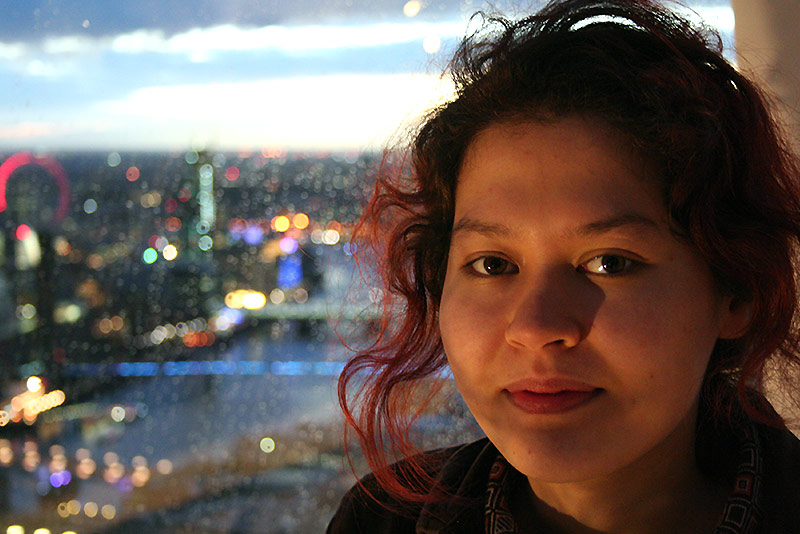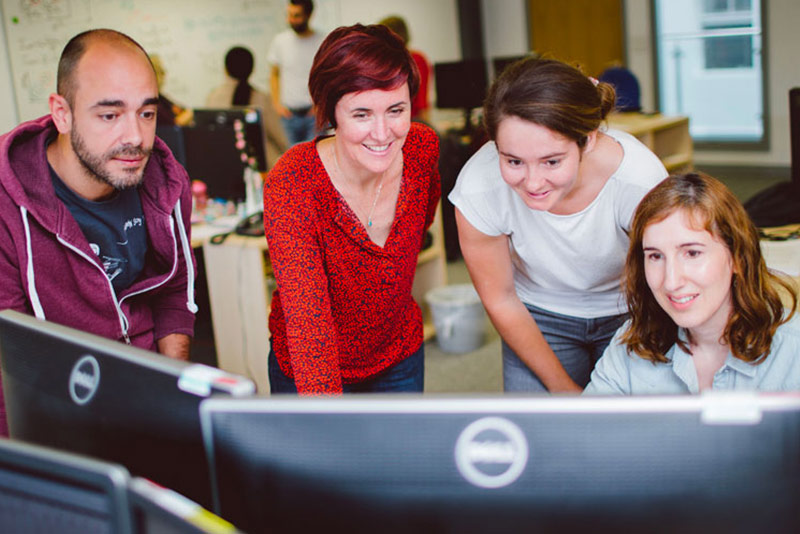Closing the diversity gap in computer science
DeepMind Computer Science Scholarships give talented graduate students from under-represented backgrounds a chance to reach their full potential.
‘I think that, as a woman, only when you see other women who influence and inspire you do you realise that you’ve been lacking that your whole life,’ reflects Mizu Nishikawa-Toomey, a recent graduate of the MSc in Computer Science. ‘And that maybe the decisions you’ve made are a result of that lack of inspiration. For instance, when I was at school I never thought that computer science was an option for me.’
It was only after picking up a Raspberry Pi computer that Mizu discovered an interest in programming. She was part way through an undergraduate degree in physics at the time, but was curious enough to pursue it on graduation. A job at a DNA sequencing company followed. ‘I ended up in the algorithm research team with four older men and felt very out of my depth,’ she says. ‘I wanted to establish my field of expertise.’
It was this desire that led Mizu to apply to study computer science at Oxford, where she became one of the first DeepMind Scholars. Established through a generous gift from leading British artificial intelligence company DeepMind in 2018, the scholarship programme seeks to support and encourage under-represented groups in the field to pursue postgraduate education.
 DeepMind Scholar graduate Mizu Nishikawa-Toomey
DeepMind Scholar graduate Mizu Nishikawa-Toomey
Across the UK, female and ethnic minority students are significantly under-represented in computer science, leading to a loss of talent and innovation in both academia and industry. This diversity gap is the result of a range of complex and interrelated structural and social barriers, including access and exposure to the subject, and the continuing perception that computing is only suited to certain groups. At graduate level these issues may be compounded by the cost of study, which can often deter those from under-represented backgrounds from persevering.
‘I had a lot of issues regarding my self-confidence during my first term,’ says Mizu. ‘I had this strong feeling of imposter syndrome and could really relate to the idea that minority groups suffer more from self-doubt. I hadn’t taken any courses in computer science before and felt very intimidated by the people around me. I didn’t know whether I could pass.’
Acknowledging that barriers to graduate participation in the field extend beyond the financial, DeepMind has worked with Oxford to provide scholars with a broad range of support. As well as being assigned a mentor from the company, Mizu was invited to DeepMind’s headquarters, where she learned how to improve her CV and what to expect at a doctoral interview. She also had the opportunity to ask questions of DeepMind co-founder and CEO, Dr Demis Hassabis.
‘The fact that big institutions like DeepMind want to make a difference to this issue was a massive motivation to work harder’
‘It was a huge motivator,’ says Mizu. ‘It made me feel like I was within grasp of something really great, and that I just had to reach a little further to get it.’ DeepMind’s support also provided a boost when her confidence was at its lowest. ‘When I was having a bad day I would just remember that someone else had faith in me.’
The friendships that Mizu developed with other women in the field, both through the scholarship programme and at other institutions, were hugely beneficial too. She also began to seek out examples of women who had made their mark before her, such as American physicist and computer scientist Arianna W Rosenbluth. ‘She came up with one of the greatest algorithms of the 20th century, the Metropolis–Hastings algorithm,’ explains Mizu. ‘As soon as I found this out I latched on to it; it was just so inspiring.’
Discovering role models – both similar in age and those more advanced in their careers – brought home to Mizu the importance of visibility. ‘If you don’t see people like yourself in the field then it’s very easy to think that this is something you won’t be innately good at,’ she says. ‘And actually I have met people who feel that the reason women are under-represented is because they’re not as capable. That view doesn’t always come from those who are trying to impede your development either, it’s just something that’s ingrained.’
 Students in the Department of Computer Science. Image by Paul Tait
Students in the Department of Computer Science. Image by Paul Tait
Increasing diversity within computer science is critical to changing perspectives like these, and to ensuring that research within the field is relevant and beneficial to the whole of society. At Oxford, a wide range of outreach programmes across the STEM subjects encourage students from under-represented groups to develop an interest in science and pursue their studies – efforts that are already beginning to pay off at undergraduate level within the Department of Computer Science. DeepMind’s commitment is key to ensuring that this progress is not frustrated by lack of ongoing support once students complete their first degree.
Despite her struggles with academic confidence, Mizu relished her time on the course: ‘I couldn’t have asked for a better experience. It helped me discover the thing that I want to focus my attention on for the coming years.’ Mizu’s plan now is to spend time honing her skills in the field of Bayesian approaches to machine learning, before applying to a doctoral programme. She also hopes to travel back to her secondary school and deliver a talk to the girls there. ‘I hope that I can be the role model that was missing from my life,’ she says
DeepMind Computer Science Scholarships are open to individuals who are ordinarily resident in the UK and who identify as female, are from Black and minority ethnic backgrounds, and/or are from households with traditionally low progression to higher education. In 2019 the company extended its commitment to under-represented groups by supporting three new DPhil scholarships in the Department of Engineering Science.
SUPPORT STUDENTS AT OXFORD